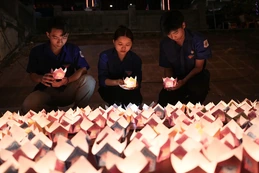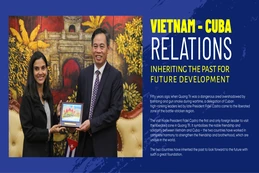Vietnam-Cuba Relations: Symbol of freedom, peace and compassion
Half a century ago, during his visit to the liberated region of Quang Tri, President Fidel Castro hoisted the flag of the National Front for the Liberation of South Vietnam from peak 241, uttering these inspiring words: "Comrades, please carry this flag of everlasting victory to Saigon." Two years later, those prophetic words materialized as the South was completely liberated on April 30, 1975. Fast forward half a century, and Cuba continues to endure a relentless siege and embargo imposed by the United States. Vietnam’s Party, State, and People remain steadfastly united in their struggle against these punitive measures on behalf of their brotherly nation, Cuba. They maintain unwavering faith in Cuba’s indomitable spirit, as the Caribbean island has long served as a beacon of freedom, peace, and compassion.

Honoring Vietnam-Cuba friendship
The strong bond between Cuba and Vietnam, forged through unwavering support for Vietnam’s just resistance war, is exemplified by the historic visit of Cuban President Fidel Castro to Quang Tri during its liberation in 1973.
This enduring relationship, marked by friendship, cooperation, and unwavering solidarity, has been cherished by generations of Vietnamese people and nurtured by leaders of both nations.
After the successful Cuban revolution, which overthrew the oppressive Batista regime and established a government for the working class, Cuba faced numerous challenges due to a blockade and embargo. The country grappled with underdeveloped infrastructure, energy shortages, stagnant transportation, and the closure of some factories.

Chairman of the National Assembly Vuong Dinh Hue was the first foreign leader to visit Cuba after the country successfully concluded the parliamentary election for the 2023-228 period.
Led by President Fidel Castro, the Communist Party of Cuba steered the Cuban ship through turbulent waters, continuing the fight to protect and develop their nation. Cuba became a revolutionary model for peace-loving, independent, and free nations around the world.
Today, Cuba’s economy is steadily recovering, with industries such as energy, tourism, mining, sugarcane, mechanical engineering, agriculture, and animal husbandry gradually modernizing. The education, health, and sports sectors remain strong and are continually improving.
In April 2023, during the visit of Vietnam’s National Assembly Chairman, Vuong Dinh Hue, Cuban revolutionary leaders General Raúl Castro Ruz and President Miguel Díaz-Canel warmly welcomed him. This visit showcased Vietnam’s deep affection for the traditional friendship and special cooperation between the two countries and provided encouragement for Cuba’s revolutionary cause.

A corner of Havana.
General Raúl Castro Ruz shared his fond memories of visiting Vietnam in 1966 and meeting President Ho Chi Minh. He praised Vietnam’s heroic struggle as a great source of inspiration and commended its socio-economic development as a model for Cuba. Both sides reaffirmed their commitment to strengthen the special friendship and solidarity initiated by leaders Ho Chi Minh and Fidel Castro, passed down to future generations.
Vietnam and Cuba also highlighted the significance of upcoming events commemorating the 50th anniversary of Fidel Castro’s visit to liberated Quang Tri in 1973 and the 60th anniversary of the establishment of the Cuban Committee in solidarity with South Vietnam in 1963. These activities, to be held in both countries, will celebrate their enduring friendship, comprehensive cooperation, and unwavering solidarity, reaffirming Vietnam’s steadfast support for Cuba’s just cause. Vietnam remains dedicated to supporting Cuba in its development and in countering blockades and embargoes, including providing food aid.
Every Vietnamese citizen today is aware that, on the other side of the globe, Cuba’s leaders and people closely follow Vietnam’s multifaceted development journey. Many high-ranking Cuban delegations and people’s organizations have visited Vietnam, both after the war and during the nation’s peaceful reconstruction and renewal process.
Many Cuban delegates were deeply moved when they discovered that in Quang Tri, every year on President Fidel Castro’s birthday, the Party Committee, Government, and People of Quang Tri organize a floral tribute at the Fidel Castro monument in Fidel Park. This gesture serves as a heartfelt commemoration of the gratitude and significant contributions of the esteemed leader and the Cuban people who wholeheartedly supported and assisted the Vietnamese revolution, particularly in Quang Tri Province.
In solidarity with the challenges faced by Cuban friends, the Party, State, and People of Vietnam firmly believe that, under the leadership of their Party and State, with the resilience and unity of the Cuban people, Cuba will surmount the difficulties imposed by blockades and embargoes. It will achieve notable progress across various sectors in the near future. Both nations' people and leaders are dedicated to strengthening the enduring bond and faithful relationship, ensuring that younger generations understand and continue to uphold the traditions of the two nations in this new era.

Cuban friends visit Fidel Park in Quang Tri.
Bracing the storm
A remarkable coincidence occurred 50 years ago when President Fidel Castro visited the liberated region of Quang Tri. Journalist Dinh Nhu Hoan, who later became Deputy Editor-in-Chief of Nhan Dan Newspaper, was just a boy living in Quang Tri’s Vinh Linh special zone at that time. Five decades later, he visited Cuba as a journalist and was entrusted by the Editorial Department of Nhan Dan Newspaper to accompany journalist Arlin Alberty Loforte, Deputy Editor-in-Chief of Granma Newspaper, during their visit to Quang Tri, where the indelible footprints of the Cuban leader were imprinted when this land had just been liberated.
During the preparations for the commemorations marking the 50th anniversary of President Fidel Castro’s visit to the liberated region of Quang Tri, Mr. Hoan shared with us his firsthand experiences in Cuba. He recounted the unwavering belief of the Cuban people in the bright future of their island—a symbol of freedom, peace, and compassion.
Mr. Hoan mentioned his visit to Cuba three years ago, a period when the country was grappling with its most severe economic challenges since the successful revolution. This was a time when the US intensified its embargo against this Caribbean nation. One vivid memory was witnessing long queues of people outside general stores, patiently waiting to purchase food and essential supplies.
Cuba has endured a prolonged and fierce embargo imposed by the US since 1962, following the failed Bay of Pigs invasion supported by the US. It was only in 2014, during President Barack Obama’s tenure, in response to calls from the United Nations and the global community, that the US initiated steps to normalize relations with Cuba.

Deputy Editor in Chief of Nhan Dan Newspaper Dinh Nhu Hoan (first from right) and a delegation from Granma Newspaper during a visit to Quang Tri.
Tourism led the way as the pioneering industry opened up, with a significant increase in American visitors to Cuba, making them the second-largest group after Canadian tourists. However, when President Donald Trump assumed office, he reversed his predecessor’s decision, prohibiting cruise ships from carrying passengers to Cuba and closing the recently opened door for improved relations between the two nations.
This ban immediately posed a challenge to Cuba’s goal of welcoming 5 million international visitors and, as reported by AFP, dealt a heavy blow to Cuban tourism, potentially costing the island tens of millions of dollars annually. Many experts believe that the US implemented this ban as a means to undermine international law, aiming to strangle Cuba’s economy and affect the living standards of its people in pursuit of political concessions. Many Cubans calmly stated, “We have and will continue to live with it,” referring to the US embargo, likening it to a troublesome neighbor whom they remain watchful of but do not fear.
Cuba is perhaps one of the few nations that has stood tall despite the US blockade and embargo. The world witnesses Cuba facing difficulties but not yielding. Since the inception of the US embargo policy until now, despite estimated losses in the trillions of dollars, Cuba remains a source of envy for wealthier nations.
The country’s focus on investments in healthcare and education is striking, with education accounting for 12.9% of its GDP. All citizens enjoy free healthcare, and Cuba boasts eight doctors for every 1,000 people. The nation is renowned for its world-class specialties such as cigars, rum, and distinctive Caribbean dances. Cubans are known for their joyous disposition, and the country boasts one of the world’s highest average life expectancies, at 79 years.

A cigar roller in Pinar del Rio, Cuba.
Among Cuba’s accomplishments, the most outstanding are in the field of healthcare. Despite facing numerous challenges, Cuba continues to send thousands of doctors to remote and poor countries worldwide, particularly in Latin America, Africa, and Asia. Humanity remembers the year 2014 when the Ebola epidemic ravaged Africa, and Cuba dispatched hundreds of doctors to numerous countries, providing direct relief and training.
Many Americans still hold deep gratitude for Cuba’s assistance during Hurricane Katrina in 2005 when Cuban doctors arrived in the nick of time, saving lives.
Epilogue
From the depths of their hearts, the Vietnamese people, who have experienced the hardships of war, can never forget the immortal words of Cuban President Fidel Castro: "For Vietnam, Cuba is willing to sacrifice all its blood." The image of Cuban President Fidel Castro, the first and only head of state to visit the newly liberated land of Quang Tri, remains etched in the hearts of the Vietnamese people. His speech at Peak 241 in September 1973, where he generously expressed solidarity and shared the Cuban people’s unwavering commitment to the selfless struggle of the Vietnamese people, remains a cherished memory.

Fidel during his visit to Quang Tri 50 years ago.
“Today, Cuba proudly holds the distinction of being the first friendly nation and government to dispatch an official delegation to the liberated region of South Vietnam. Our delegation deeply appreciates the privilege of meeting valiant Cuban soldiers like you and being among the heroic people of South Vietnam. In this modern era, no other nation has displayed the same unwavering determination and resilience in their quest for independence as the Vietnamese people,” said Fidel.
Over the past five decades, on the very land that the Cuban hero Fidel Castro once visited, life has flourished through the diligent efforts and creative abilities of the people of Quang Tri. This region has witnessed the remarkable phenomenon of “steel blossoming,” where life has emerged from the devastation of war. I shared my sentiments with my colleagues: "Quang Tri, from the depths of its historical significance and the aspirations of its people and international friends, symbolizes the yearning for peace of the Vietnamese people and humanity as a whole."

Dong Ha City today.
From Quang Tri, where journalist Dinh Nhu Hoan led his colleagues from Granma Newspaper on a visit, he spoke about Cuba with a heartfelt connection: "The Cuba of today evokes memories of the iconic photograph of the ship that liberated Granma more than 60 years ago. Despite facing grave losses and having only 12 soldiers left, Fidel Castro and his comrades surmounted all sacrifices and hardships to build a formidable force. Three years later, they waged a decisive battle that reverberated worldwide, transforming Cuba into an Island of Freedom. The revolutionary vessel of that era has now evolved into a mighty battleship proudly sailing on the vast sea, representing freedom, peace, and compassion."
Indeed, more than six decades have passed, but the Cuban revolutionary spirit endures. As time marches on, many things may change, but one constant remains unaltered: in the hearts of every Vietnamese and Cuban, Fidel Castro stands as an enduring symbol of revolutionary heroism and the aspiration for freedom and happiness.
PHUONG MINH - LAM THANH - TU LINH - HOAI HUONG - NGOC MAI
PHOTOS: SI SO, VNA, MINH DUC, TRAN TUYEN, LE TRUONG
1:25:09:2023:18:21 GMT+7








